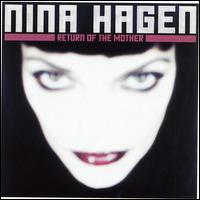
Johann "Hans" Hölzel, better known by his stage name Falco, was an Austrian singer and musician.

Catharina "Nina" Hagen is a German singer, songwriter, and actress. She is known for her theatrical vocals and rose to prominence during the punk and Neue Deutsche Welle movements in the late 1970s and early 1980s. She is known as "The Godmother of German Punk".

Zarah Leander was a Swedish singer and actress whose greatest success was in Germany between 1936 and 1943, when she was contracted to work for the state-owned Universum Film AG (UFA). Although no exact record sales numbers exist, she was probably among Europe's best-selling recording artists in the years prior to 1945. Her involvement with UFA caused her films and lyrics to be identified as Nazi propaganda. Though she had taken no public political position and was dubbed an "Enemy of Germany" by Joseph Goebbels, she remained a controversial figure for the rest of her life. As a singer Leander was known for her confident style and her dark, veiled voice.
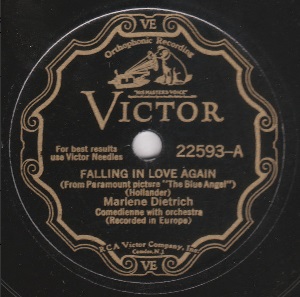
"Falling in Love Again " is the English language name for a 1930 German song composed by Friedrich Hollaender as "Ich bin von Kopf bis Fuß auf Liebe eingestellt". The song was originally performed, in the 1930 film Der Blaue Engel, by Marlene Dietrich, who also recorded the most famous English version, which became her anthem. Dietrich is backed by the Friedrich Hollaender Orchestra.
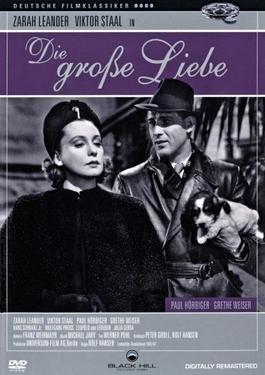
The Great Love is a 1942 German drama film directed by Rolf Hansen and starring Zarah Leander, Viktor Staal and Grethe Weiser. It premiered in Berlin in 1942 and went on to become the most commercially successful film in the history of the Third Reich.

Revolution Ballroom is the sixth solo studio album by Nina Hagen, released in 1993.

Nina Hagen is the fourth solo studio album by German singer Nina Hagen. It was released on October 8, 1989, by Mercury Records.
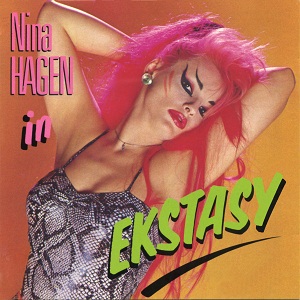
Nina Hagen in Ekstasy is the third solo studio album by German singer Nina Hagen. It was released on January 10, 1985, by CBS Records. The German version of the album Nina Hagen in Ekstase was released simultaneously. It was Hagen's last album released on the CBS label, before her recording contract expired in 1986. The album is mainly produced by Adam Kidron and was recorded in Ibiza and Paris. Hagen worked with Karl Rucker and Billy Liesegang and wrote most of the songs on the album. Unlike her previous disco-influenced album Fearless (1983), Nina Hagen in Ekstasy is musically more punk rock with elements of dance music. It contains cover versions of Frank Sinatra's "My Way" and Norman Greenbaum's "Spirit in the Sky".
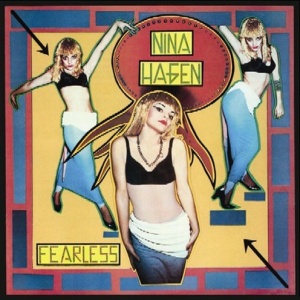
Fearless is the second solo studio album by German singer Nina Hagen. It was released in November 1983 by CBS Records. The German version of the album entitled Angstlos was also released. Produced by Giorgio Moroder and Keith Forsey, the album was a major musical departure from her previous mostly new wave material. Unlike her experimental album NunSexMonkRock (1982), Fearless is a dance-pop album with influence of disco. It also incorporates other genres such as hip hop.
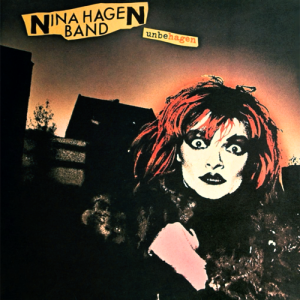
Unbehagen is the second studio album by Nina Hagen Band, released in 1979 by CBS Records. It is the last album released by the band, before Nina Hagen decided to pursue a solo career. The band kept on performing under the name Spliff.

14 Friendly Abductions is a "best of" compilation album by Nina Hagen, released in 1996. AllMusic rated it 4 1/2 out of 5.
Live in Krefeld by Nina Hagen was recorded at Kulturfabrik in Krefeld and released in 2001.
"New York / N.Y." is a song by German artist Nina Hagen from her album Angstlos. Co-written by Hagen, Karl Rucker and Steve Schiff, it was released as the record's lead single in 1983. The song was later included on Hagen's compilation albums 14 Friendly Abductions, Definitive Collection, Prima Nina in Ekstasy and The Very Best of Nina Hagen. Nina Hagen raps in the English and the German version of the song. Only the refrain "New York, New York", which is repeated several times, is sung by her.
Das Herz der Königin is a 1940 German historical film, making selective use of the life story of Mary, Queen of Scots, and her execution by Queen Elizabeth I for anti-English and pro-Scottish propaganda, in the context of the Second World War going on at the time.
"Ich weiß, es wird einmal ein Wunder gescheh’n" is a song composed by Bruno Balz and Michael Jary, which was originally recorded by Swedish actress and singer Zarah Leander. It first appeared in the 1942 film Die große Liebe.
Ein Schloß am Wörthersee is a German–Austrian comedy television series made by Lisa Film and RTL, known internationally as Lakeside Hotel.

Volksbeat is the thirteenth solo studio album by Nina Hagen, released on November 11, 2011 by Koch Universal. It is the first all-German Nina Hagen album since 1995's FreuD Euch and contains covers as well as original songs.
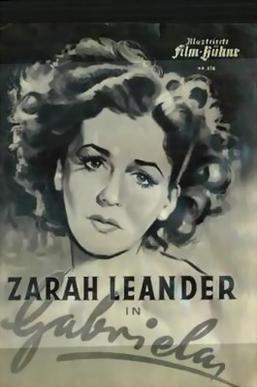
Gabriela is a 1950 West German musical drama film directed by Géza von Cziffra and starring Zarah Leander, Carl Raddatz, and Vera Molnar. It was Leander's comeback film after a seven-year absence from filmmaking. In 1943 when the Nazi leadership had demanded she take German citizenship, she had broken her contract with UFA and returned to her native Sweden. In the immediate post-war era she was banned from appearing in German films because of her previous association with the Nazi hierarchy. When the law was lifted in 1949, she was able to make films once more.
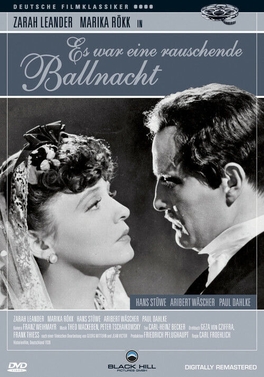
The Life and Loves of Tschaikovsky or It Was a Lovely Night at the Ball is a 1939 German historical drama film directed by Carl Froelich and starring Zarah Leander, Aribert Wäscher and Hans Stüwe. The film portrays the fictional relationship between the Russian composer Pjotr Iljitsch Tschaikowsky and an aristocratic woman who, unhappily married, falls in love with him and decides to secretly support his work financially. It premiered on 13 August 1939 at the Venice Film Festival.
